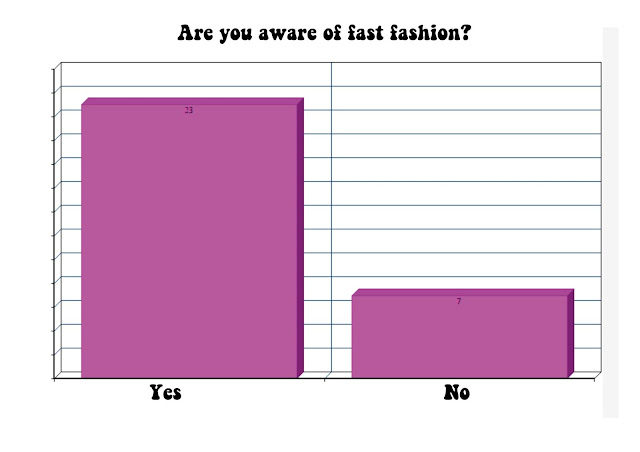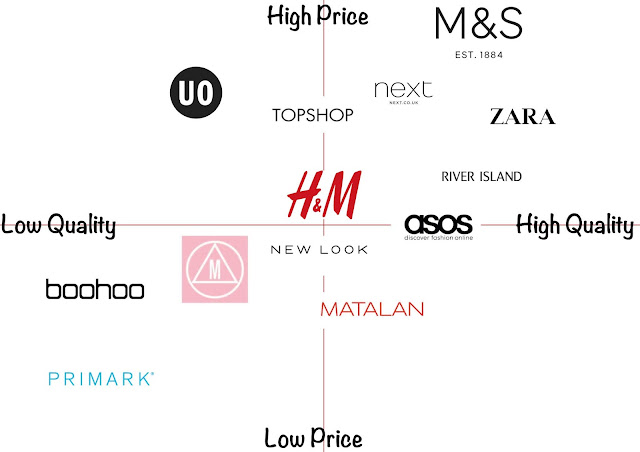Primary Research
To gain primary research I went to the Topshop store in Liverpool One. I conducted a series of small interviews with shoppers as they were walking in and out of the store. I wanted to gain their opinions on the ethnicity and sustainability of the brand and see how much of an understanding they had on the idea of fast fashion.
I asked a total of 30 people of a range of different ages. I got the most responses from the 26-35 age bracket and the least responses from the 46-55 and the 56+ age bracket. The research suggests that the most frequent shoppers at Topshop are a younger demographic.
The number of people who fell under each age bracket were:
I asked a total of 30 people of a range of different ages. I got the most responses from the 26-35 age bracket and the least responses from the 46-55 and the 56+ age bracket. The research suggests that the most frequent shoppers at Topshop are a younger demographic.
The number of people who fell under each age bracket were:
- under 18 - 6
- 18-25 - 6
- 26-35 - 10
- 36-45 - 3
- 46-55 - 2
- 56+ - 2
To gain a more well rounded view of the main demographic of Topshop and Topman I asked people their gender almost al of the people I talked to were female with only a small percentage were male which suggests that Topshop is more popular than Topman.
I spoke to 24 women and only 6 men about their opinions on Topshop and Topman.
Topshop has been reported to be a major contributor to the fast fashion industry and therefore has been criticised by having an impact on the environment and not really doing anything to try and change it. There have been suggestions that they are part of the sustainable cotton group but there has been no evidence to suggest this.
After speaking to a range of people who shop at Topshop, not all knew what fast fashion was and therefore did not understand the impact this could have on the environment. The people that did know what fast fashion was knew that it had an impact on the environment because of the quick turn around that happens, but did not fully understand the specific impact it can have, such as using up water supplies, polluting water and the labour costs of women abroad.
The collection Beyonce collaborated on with Topshop, Ivy Park, is an example of how Topshop have contributed to non sustainable and fast fashion. Of the people that I spoke to, the ones that knew about the collection also knew that Beyonce has decided to remove the line after the controversy surrounding Philip Green. There have also been claims about the conditions that the women work in and that they are not suitable and something should be done about it. There have been people looking into the sweatshops as the women who make the Ivy Park range are only paid £4.30 a day.
I asked the people taking part in my survey if they had seen any ethical or sustainable lines within this particular store at any point in the time that they had been shopping there. I found there was quite an even split in terms of what people had seen as the Reclaim to Wear collection has previously been available in the Liverpool store.
As many people had not seen any sustainable or ethical lines in this store, I asked them if they would want to see more of these types of lines in the store. Almost all of the people I asked did want to see more sustainable or ethical lines in store as there has recently been a huge push for us to be more sustainable and environmentally friendly. As Topshop have only had one sustainable range recently this would be a perfect way for them to become a much more up to date brand.
One of the questions I asked was if people believed that Topshop and Topman are an ethical and sustainable brand. Almost everyone answered no as there has not been much evidence to suggest that they are doing anything to try and become more sustainable and environmentally friendly. As many people were aware of the low wages the brand pay the workers who make the clothes they said that this was something that would make them feel as though the brand was more ethical and sustainable as they would be doing something to help them.
After asking all of the above questions the last question I asked was if they would continue to shop at Topshop despite some of the answers they had given. Almost everyone I asked said they would which suggests that people do care about issues such as sustainability as shown by how they answered previous questions, but they don't care enough to change their shopping habits and do something about the society of fast fashion. 22 out of the 30 people I spoke to saids they would definitely continue to shop at Topshop and only 2 people said that they would stop based on the information they had learned by answering the questions.











Comments
Post a Comment